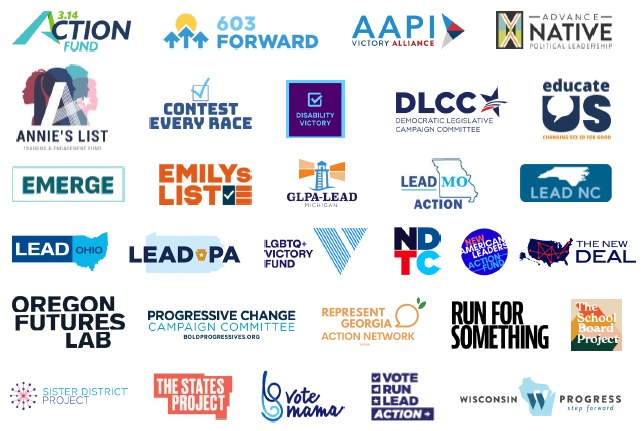RESEARCH: SURVEY OF 2024 STATE & LOCAL CANDIDATES
This research initiative builds upon similar projects conducted just after the 2018, 2020, and 2022 elections; these studies were designed to examine and learn from the experiences of progressive candidates who ran for state and local office, with the explicit goal of improving efforts to recruit and support them and future candidates. In essence, these research investments are meant to build, expand, and strengthen the “pipeline” we need to be successful in effecting change across our communities and our country with bold, effective, and diverse new leaders.
See the full results here.
We thank our partners for their generous assistance.

Key Takeaways:
- Recruitment remains vital to building a diverse and representative pipeline. Progressive organizations should leverage the influential role of community leaders, friends, and family, whose personal encouragement is key to recruiting younger and diverse candidates and supporting them through the challenges of running for office. Additionally, engaging local party officials more actively in recruiting these groups presents a significant opportunity. While white candidates continue to benefit more from local party leaders, their experience and connections are invaluable for helping younger and diverse candidates succeed.
- Advocacy and making government reflective of the people are core values for candidates. Younger candidates and candidates of color are deeply motivated by a commitment to making a difference on key issues and serving their communities. Recruitment strategies should emphasize these values and reinforce them throughout the campaign cycle to ensure candidates find the experience meaningful and fulfilling.
- Candidates highly value the support and guidance provided by third-party organizations and are hungry for even more assistance, particularly first-time candidates and candidates of color. These candidates often run on limited budgets with little to no staff, relying on inexperienced friends and family for help. They would especially appreciate additional expertise on campaign basics and infrastructure. Expanding resources and connecting first-time candidates with experienced volunteers and mentors can bridge critical gaps and set them up for success.
- Fundraising and volunteers are the lifeblood of campaigns, yet only a minority of candidates report receiving help in these areas—37% for volunteers and 23% for raising money from others. While candidates value direct contributions from third-party organizations, they are eager for more support in accessing new donor networks and raising money from others. These organizations have a crucial opportunity to act as a bridge, connecting candidates with community members and allies eager to contribute their time, energy, and financial resources to support progressive campaigns.
- The polarized political landscape presented major challenges for down-ballot candidates. A majority of candidates reported negative impacts from the presidential race, struggling to defend against misinformation and attacks on the Democratic brand while trying to connect with skeptical voters as individual candidates. Harassment based on political views, the most common form of targeting, further compounded the emotional toll of campaigning in this toxic climate. Candidates need support to counter misinformation, engage persuasion audiences, and protect their personal well-being.
- Harassment and intimidation have become disturbingly common for candidates, with six in 10 reporting threats or harassment during their campaigns. Younger women, immigrants (or first-generation Americans), and candidates with disabilities experience especially high rates of harassment, ranging from personal insults and disinformation to property damage. These attacks take a significant personal toll and create real-world challenges for campaigns. Yet, training and support in these areas remain limited. Candidates are seeking more tactical and strategic guidance on how to handle online attacks, disinformation, and maintain personal safety effectively.
- Nearly half of pipeline candidates ran in safe or leaning-Republican districts, where challenges are especially pronounced. Building infrastructure, recruiting volunteers, and overcoming hostility toward the Democratic brand are all significant hurdles. To expand into red areas, progressive organizations must provide tailored resources and guidance to address these unique obstacles.

